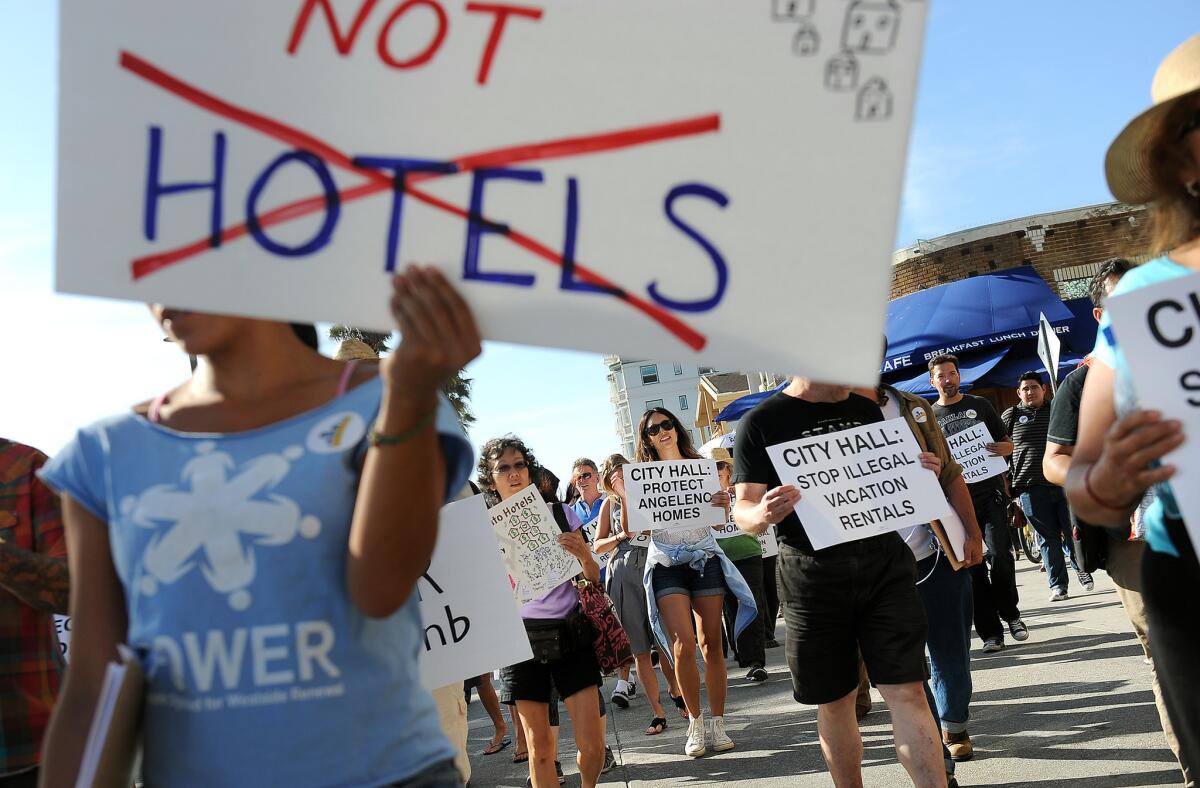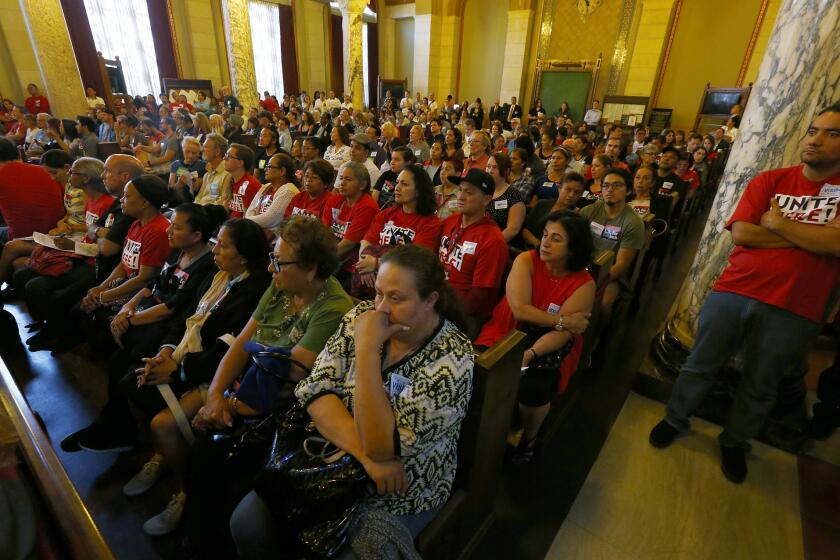L.A. and Airbnb launch system meant to help with enforcing rental rules

- Share via
Los Angeles and Airbnb have launched a new system meant to help the city ferret out and remove illegal listings from the online platform, a step that L.A. officials say is crucial to enforcing its restrictions on renting out homes for short stays.
The new system “will significantly streamline the process for identifying and taking down illegal short-term-rental listings,” planning department spokesman Yeghig Keshishian said in an email. “In many ways, it’s the missing piece to the puzzle.”
Los Angeles has struggled to crack down on illegal rentals: More than a year after new rules meant to protect housing and limit short-term rentals went into effect, a Times analysis found thousands of unregistered listings remained on Airbnb. City officials recently estimated that more than 6,000 listings on the platform were out of compliance.
More than a year after L.A. clamped down on renting homes for short stays, many rental hosts appear to be ignoring the new law.
The municipal law requires short-term-rental hosts to register with the city, which checks whether they are meeting key requirements such as renting out their own “primary residence” rather than a second home or investment property. Advertising an unregistered rental, which is illegal, could be a way for scofflaws to try to dodge the city rules.
The new system, announced Monday, makes it easier for Airbnb and the city to share information and strip illegal listings from the platform. Planning officials said they were already able to remove more than 1,350 ineligible listings when it was being tested last week.
“Airbnb is the only platform that has developed a first-of-its-kind system that both helps the city and helps hosts who share their homes in a responsible way,” said John Choi, Airbnb’s Southern California public policy manager.
Tenant and neighborhood groups had complained that delays rolling out that system had hampered enforcement: Under an agreement between Airbnb and the city, the platform had to boot off a number of “categorically ineligible” listings identified by the city but did not have to remove any other illegal listings until the new system was in place.
City staffers had also complained about delays. Emails obtained by The Times through a public records request show that in February, a city planner said he had told Airbnb that “management is extremely dissatisfied with their progress ... and strongly questions Airbnb’s sincerity to completing the project.”
In May, another city planner groused that “Airbnb’s commitment of sufficient resources to this task did not begin in a timely manner.”
Choi responded to that email by pointing out that the company had suffered layoffs that had directly affected the team working on the system.
Airbnb, in turn, repeatedly raised concerns last year with the city about promptly getting information about city guidelines that would help the company design the new system, emails from the company to the city show. Key guidelines for hosting platforms were not approved until last fall, months after the ordinance went into effect.
In June, Airbnb first announced that it was launching the long-awaited system. Then the office of Mayor Eric Garcetti put those plans on hold: Garcetti spokesman Alex Comisar said the decision stemmed from a June memo urging city departments to assess how any new policies would affect city revenues as L.A. stared down a budget crisis.
Planning director Vince Bertoni warned in a July email to a Garcetti aide that holding off on the new system would “significantly limit” enforcement. Bertoni said that Airbnb had been “immune” from many requirements under L.A.’s ordinance because of the agreement, and “no other host/platform has this protection.”
Bertoni added that rolling out the new system could also help the city combat party houses that were operating as unregistered Airbnb listings, addressing a concern that Garcetti has raised publicly during the COVID-19 pandemic.
Planning officials also argued in a report that cracking down on illegal Airbnb rentals was not likely to slash revenue from lodging taxes, since most travelers would simply book legitimate rentals instead. Comisar said last week that after the report was reviewed by finance officials, “we immediately gave them approval to move forward with implementation.”
Groups that had bemoaned problems with enforcement said they were pleased to see the system in place. “Short-term rentals can be regulated if the city aggressively enforces the law it passes, and up until now, that hasn’t happened,” said James Elmendorf, policy director with the Los Angeles Alliance for a New Economy.
Now “the real test will be if the city actually fines both these hosts and the platforms that illegally list them,” he said.
More to Read
Sign up for Essential California
The most important California stories and recommendations in your inbox every morning.
You may occasionally receive promotional content from the Los Angeles Times.












